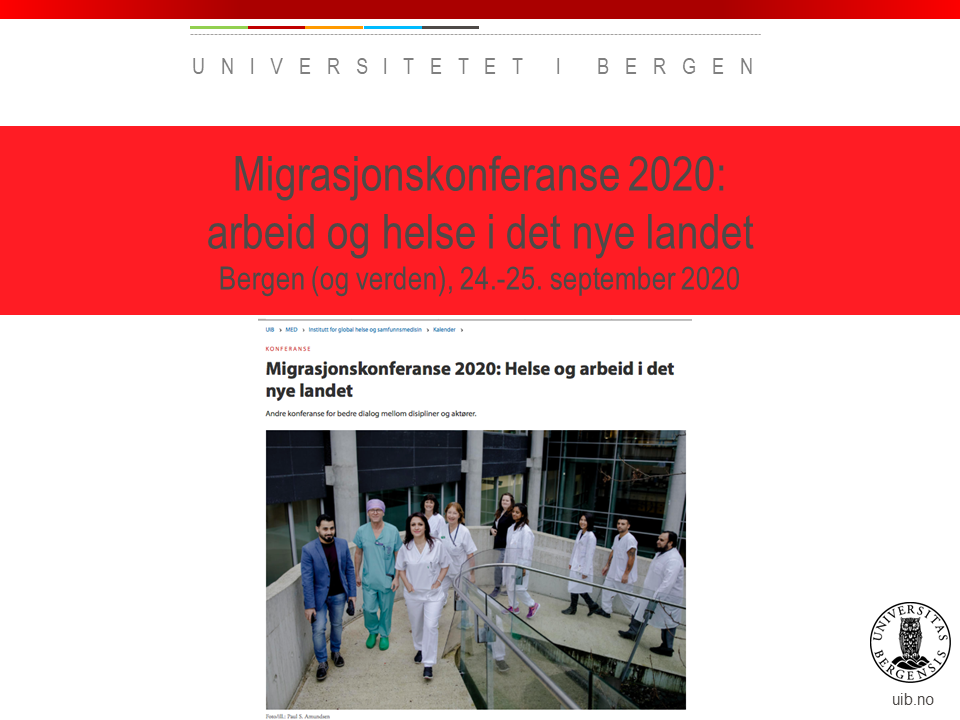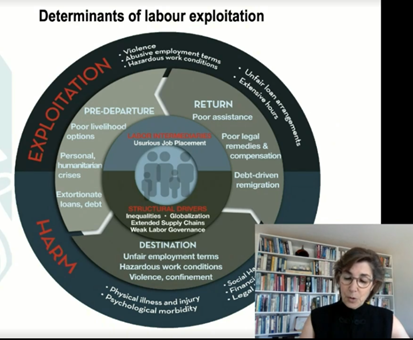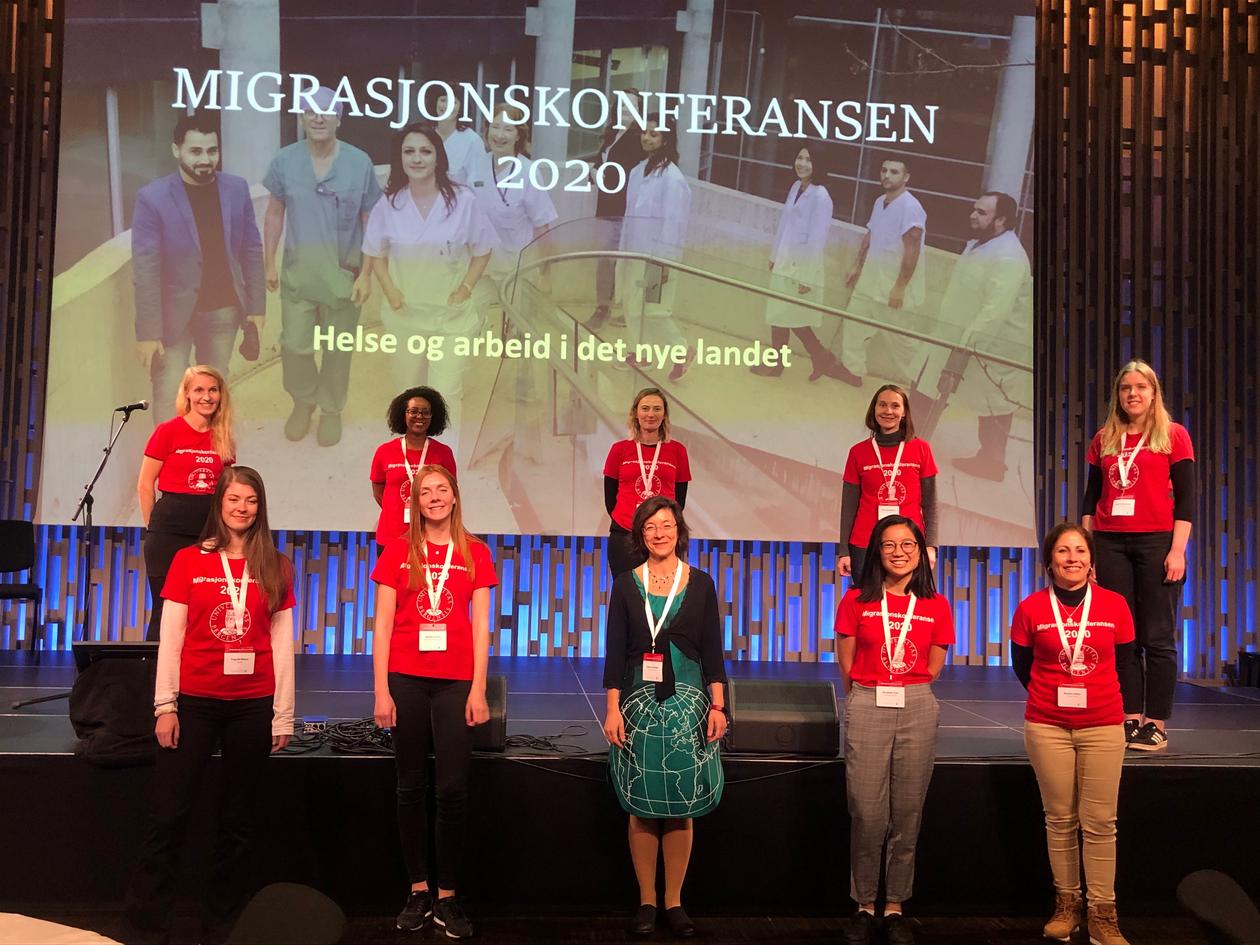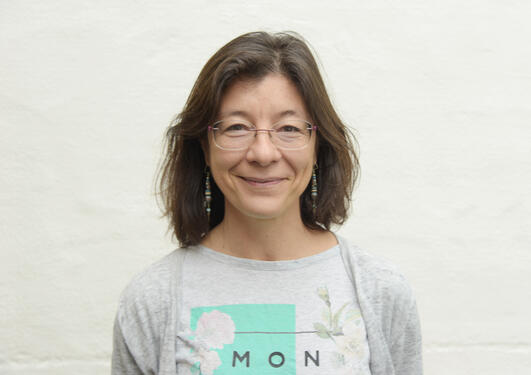Being healthy and working in a new country
Migration is a global phenomenon bringing both global benefits and global challenges.

Main content
The Migration Conference 2020 was primarily a national one, bringing together diverse health stakeholders, including researchers, health practitioners, volunteer organisations and students to debate issues and best practice, share experiences as well as learning about some of the latest research results, and planning the way forward for this important activity.
Several national organisations collaborated with the University of Bergen (UiB) to organise the conference: the Norwegian Institute of Public Health, the Norwegian Directorate of Health, and Global Health Norway. The conference was led by two Professors, Esperanza Diaz, from the Faculty of Medicine, UiB and Gro Mjeldheim Sandal, from the Faculty of Psychology, UiB.
The goals for the 2nd UiB Migration Conference were to improve practice in this area, to improve training and education, and to encourage and develop innovative, collaborative research projects in this field. Around 200 people participated in the conference, which ended up being blended between face-to-face and online attendees due to COVID-19 restrictions.
Migration / Global Challenges are a UiB priority
Participants were welcomed by Margareth Hagen, Pro-Rector at UiB. Hagen underlined that Global Challenges are one of 3 priority areas at UiB. She highlighted the conference as being an excellent opportunity for gathering people across disciplines as well as across professions and sectors, including students, to engage in meaningful dialogue about migration and immigration – an important global challenge.
Bergen declaration 2018 on migration
UiB’s first migration conference was held in 2018: Migration Conference 2018 – health in all we do (more information in Norwegian). The outcome of the conference was a multi-point declaration that recognised concerns and needs, highlighted specific issues, and recommended actions. Following the conference, this declaration was delivered to State Secretary at the Ministry of Health and Care Services, Anne Grethe Erlandsen. Read more in Norwegian.
Read the declaration in English / in Norwegian.
In the 2 years since the first migration conference, and in addition to delivering a declaration to the Norwegian government, migration researchers have established a national research network for migration and health, and Diaz and Bernadette Kumar have written the first ever book to address Migrant Health from a primary care perspective. Many Master and PhD candidates have started and completed their training, specialising in topics in this area and there are discussions about including the issue of migrant health in the compulsory training for medical students.
Exploitive labour is a global health concern
Cathy Zimmerman, from the London School of Hygiene & Tropical Medicine, was the keynote speaker. Zimmerman is a behavioural and social scientist and leads research on migration and health.
In true global fashion, Zimmerman sent her talk via video (see picture in the right side bar). She is currently working in Nepal and was visiting New Zealand. She was therefore unable to attend the conference in person due to COVID-19 restrictions.
According to Zimmerman, exploitive labour is a global health concern. It is equivalent to modern slavery, she says, and nearly 25 million people are in situations of forced labour today. As she highlighted the results of several studies, Zimmerman underlined the UN definition of trafficking.
Among other things, Zimmerman gave participants 2 questions to think about during the course of the conference
- What are the differences between migrant workers, exploited workers and trafficked workers?
- What are the determinants of human trafficking and labour exploitation?
Read Human trafficking and exploitation: A global health concern, an article in PLOS Medicine, where Cathy Zimmerman is a co-author.
Inclusive working life
Many institutions and organisations in Norway, especially public ones, support the idea of inclusive working life. Diaz challenged conference participants in her conference opening remarks: How does reality compare to intent? She highlighted the additional challenges migrants experience in their working lives as a result of the COVID-19 epidemic.
Information from the Norwegian government Norwegian / English

In the above slide, 15% of Norwegians having contractive COVID-19 are immigrants. Of the total number of people tested for COVID-19 in Norway, 31% of those having a positive test have been immigrants. Of the immigrants who have contracted COVID-19, 36% have been hospitalized and 13% have died.
Multidisciplinary approaches
On the second day of the conference, Diaz gave a presentation about the importance of multidisciplinary, multi-sector approaches to migrant health. The issues in this area are complex and will be most optimally addressed by combining approaches and skills from different health sectors. She particularly highlighted the need for increased cultural understanding.





